Blogging & Musing


FICTION IS A MAGIC TRICK of sorts. But at its best it doesn’t just conjure up an imaginary world; it makes the real one disappear, it makes the author disappear. Only a book can do this — let you lose yourself so completely. So, if you can, forget about everything else. Just be there with the book.
Jami Attenberg, Author of All Grown Up
Interview, NY Times Book Review, March 26, 2017
And in the other corner . . .


A GREAT OBSTACLE to good education is the inordinate passion prevalent for novels, and the time lost in that reading which should be instructively employed. When this poison infects the mind, …[t]he result is a bloated imagination, sickly judgment and disgust towards all the real businesses of life.
Thomas Jefferson
Letter to Nathaniel Burwell, March 14, 1818
| Click on images | |||||
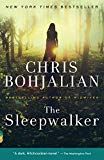 |
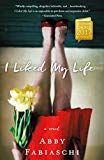 |
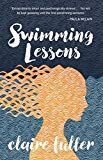 |
|||
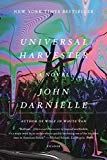 |
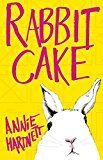 |
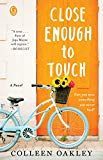 |
|||
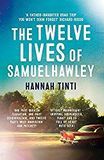 |
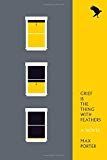 |
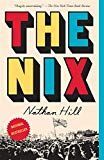 |
|||
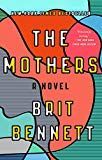 |
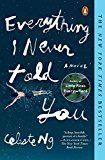 |
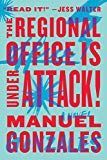 |
|||
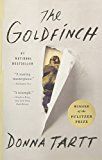 |
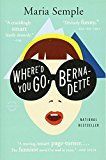 |
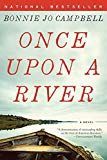 |
|||
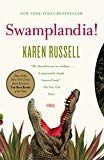 |
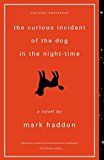 |
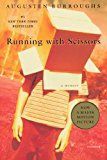 |
|||
Have you noticed the number of absent mothers at the heart of new novels lately? So far I count SEVEN—in the first quarter of 2017 alone—surely there are more.
1/10 The Sleepwalker
1/31 I Liked My Life
1/ 7 Swimming Lessons
1/ 7 Universal Harvester
3/ 7 Rabbit Cake
3/ 7 Close Enough to Touch
3/28 Twelve Lives of Samuel Hawley
Then there are last year's books, as well as those over the past several years—most famously The Goldfinch and Where'd You Go, Bernadette. We can even go back to the early-aughts.
The missing mothers in these stories TAKE OFF…
or wander off…
or die…
or are killed…
or kill themselves.
Sometimes it happens before the novel opens, sometimes within its pages.
Whenever or however they disappear, fictional moms leave heartbreak and loneliness in their wake—a grief so profound it shapes a character's motivations and actions throughout the novel.
It is an age-old literary trope, which authors use to set their protagonists on the path of the Hero's Journey—a quest for self-discovery, belonging, and self-acceptance.
One of the best missing mother novels? Dickens' David Copperfield—the mother of all missing mother stories.
By the way...I've written on a this subject a number of years ago. See Lost Mothers—Why authors bump off moms.
 Rachel Cusk, wants to reinvent the novel, at least according to the New York Times Book Review.* Just writing that makes me break into a sweat. Why do we have to reinvent the novel?
Rachel Cusk, wants to reinvent the novel, at least according to the New York Times Book Review.* Just writing that makes me break into a sweat. Why do we have to reinvent the novel?
Okay, I get it. It's a bit like composers wondering where to take symphonic music after Beethoven. Ludwig pretty much said it all.
Poor Johannes Brahms: when folks heard his first symphony, they went, "OMG! It's Beethoven's 10th." Or so the story goes.
After 200+ years of the novel as art form, it's understandable that authors might want to try something different.
Perhaps you've noticed the trend toward SHIFTING POINTS OF VIEW, different characters taking turns at the helm…
. . . surely you've noticed the frequent use of SHIFTING TIME FRAMES, the lack of straightforward chronology…
. . . or maybe you've noticed the use of ALTERNATIVE TEXTS: news clips, diary entries, handwritten letters, scholarly papers, emails, even PowerPoint…
. . . how about the use of ALTERNATE REALITIES?
Sometimes it's hard to tell exactly where you are...or what character you're following—one of the criticisms leveled at Paul Auster's otherwise highly touted new book 4321. Other times, all this narrative disruption can make it hard to engage with the characters.
Yet we know people see and experience life differently. And that is precisely what the new fiction is trying to get at—to point out that human perception isn't cut in stone, that there is more than one way of seeing a particular event, and that memory is faulty.
Nonetheless, don't you miss the comfort of a single narrator? I do. I have a yen for that 19th-century style of writing in which someone steps onto your front porch, claims a seat, and tells you a grand story.
I hate being old-fashioned and curmudgeonly. But I'm weary of the fact that EVERY new book I pick up messes with point of view and chronology. Friends, I just had to get that off my chest.
* New York Times Book Review, January 29, 2017, cover review of Rachel Cusk's Transit.
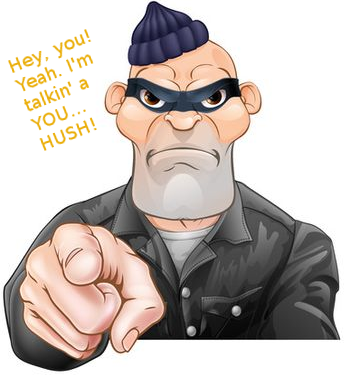 Ha! And you thought librarians were goody-two-shoes. Well, here's a TRUE CRIME story that'll make your toes curl.
Ha! And you thought librarians were goody-two-shoes. Well, here's a TRUE CRIME story that'll make your toes curl.
The AP reported that the county library in Sorrento, Florida, was caught red-handed in a devilishly clever SCAM. Over the course of nine months some 2,000 books had been checked out by a fake card holder.
Now THAT, dear reader, is registration fraud. But get this: the books were always returned. Within an hour. Undamaged.
The Big Reader was Chuck Finley, except Chuck Finley doesn't exist (at least with an East Lake Library card). It turns out two librarians had dummied up an ID and used it to check out books, dozens at a time—everything from John Steinbeck's Cannery Row to Why Do My Ears Pop, a children's book by Ann Fullick.
It was all for a good cause—to save the books from the chopping block because books that HAVEN'T BEEN CHECKED OUT for a period of time are removed from the county system. So the two librarians took it upon themselves to SAVE as many books as they could.
Until someone ratted them out. What a kill joy.
But who's the bad guy here—the fink or the perps? Bleed though our hearts may, it's hard to say. With some 300,000 titles published a year by major U.S. houses (50,000+ for fiction alone), libraries face a serious SHORTAGE of space. Budgets aren't the only thing being squeezed… so are books on shelves.
Still, how can we NOT relate to these two benighted—or beknighted—souls, so enamored of books that they can't bear to have them tossed in the dust bin of history? (Btw, I've no idea what's become of our librarians—to say nothing of all the BOOKS.)
A humorous yet sad tale.
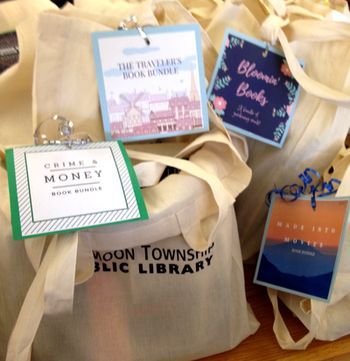 So imagine: you're walking into one of your local library branches, as I was recently, and you find right in front of you a sumptuous table, positively laden with tote bags—each of them charmingly tagged by theme and filled with used books.
So imagine: you're walking into one of your local library branches, as I was recently, and you find right in front of you a sumptuous table, positively laden with tote bags—each of them charmingly tagged by theme and filled with used books.
For $10 any Book Bundle could be yours. Patrons get the books (from 4 to 6), AND they get the tote bag. It's enchanting.![]()

 Scroll down to our previous post about the hundreds of Girl Titles in the publishing world. Book after book with "girl" in the title.
Scroll down to our previous post about the hundreds of Girl Titles in the publishing world. Book after book with "girl" in the title.
I griped about the use of the G-word as a throw-back to the bad old days when women were easily dismissed and occupied lower rungs on the cultural ladder.
But, hey! Girl titles sell books. The first "Girl" may have been Susanna Kaysen's 1993 Girl, Interrupted. But it wasn't until 2005, with Steig Larsson's The Girl with the Dragon Tattoo, et.al., that the trend seemed to take off. Next came Gone Girl and Girl on the Train.
Now it's a full blown trend. Publishers want in on it—so they're busy RENAMING OLD TITLES, hoping to breathe new life into older books. Take a look ...
New Girly Titles
For Old Books
Remarkable Creatures
by Tracy Chevalier
Girls Who Dug Rocks
Little Women
by Louisa May Alcott
Little Girls
The Age of Innocence
by Edith Wharton
Girls Wearing Corsets
My Beloved World
by Sonia Sotomayor
The Girl Who Made It All the Way to the Supreme Court
Where'd You Go Bernadette
by Maria Semple
The Girl Who Left Her Daughter (But Kept in Touch)
Hunger Games
by Suzanne Collins
The Girl Who Runs with Sharp Objects
Wild
by Cheryl Strayed
The Girl Who Went for a Walk and Then Felt a Lot Better
Lean In
by Sheryl Sandberg
The Girl Who Kicked Corporate Butt
Pride and Prejudice
by Jane Austen
The Girl with Prejudice & the Man with Pride, or Vice Versa
Obsessive Genius: The Inner Life of Marie Curie
by Barbara Goldsmith
Hey, Girl—You're the Bomb
I Am Malala
by Malala Yousafzai
The Girl Who Damn Well Better Win the Nobel Prize
The Invention of Wings
by Sue Monk Kid
The Girl Who Owned a Slave … Who Was Also a Girl
Flight Behavior
by Barbara Kingsolver
Climate Change Girl
The Signature of All Things
by Elizabeth Gilbert
The Girl Who Watched Fungus Grow and Became Famous
The Woman in Cabin 10
by Ruth Ware
The Girl in Cabin 10
 Oops ... about to show my age. Remember A Woman of Substance by Barbara Taylor Bradford? Back in 1979 it was yuge, a bestselling book and later a TV movie.
Oops ... about to show my age. Remember A Woman of Substance by Barbara Taylor Bradford? Back in 1979 it was yuge, a bestselling book and later a TV movie.
Today it would be "A Girl of Substance." Talk about lost in translation.
What's the big deal? Well, if you have to ask, you're too young to have been around during the nascent Woman's Movement in the late-'60s and '70s.
You've seen Mad Men, right? It was like that, even into the 70s. I was there. To be called a "girl" was dismissive. "My girl can get you coffee." Or, "Nah. Don't bother. The girls can clean that up." Age didn't matter—21, 41, or 61—we were just girls, not women of substance.
Which is why I get all dithered-up by the use of "GIRL" in the dozens and dozens of recent BOOK TITLES—some 200. I know because I made a LIST. (Click button for a laugh!)![]()
Next up? Publishers eager to cash in on this hot new trend are updating old titles with new, GIRLY-GIRL ones. CHECK OUT OUR NEXT POST to find out which of your favorite books have been given new titles. You'll howl.
 As "crimes" go, the literary ones are of the lesser sort: plagiarism and phony memoirs don't injure, maim, or kill anyone.
As "crimes" go, the literary ones are of the lesser sort: plagiarism and phony memoirs don't injure, maim, or kill anyone.
Even so, a few misdemeanors on the docket have managed to show a depressing lapse in ethics or taste.
1. The money grab.
The "discovery" of Go Set a Watchman ranks at the top of the list. Harper Lee's lawyer Tonya Carter claimed to have discovered the original manuscript of To Kill a Mockingbird in February 2015. But others insist it had been discovered in 2011 by an agent from Southeby's—and that Carter had been present when it was found.
Only after Alice Lee, Harper's sister and long-time protector, died did Carter announce her "discovery" of the book. The entire episode reeks of an easy money scheme and, worse, the manipulation of an 89-year-old stroke-afflicted woman. You can find two good articles here: one in the New Republic and another in the New York Times.
2. The tattle tale.
Elena Ferrante's real name, a long-kept secret, was just revealed the other day. In the scheme of things, it's hardly serious—except perhaps for the author of My Brilliant Friend (plus two sequels).
So for what higher purpose did Italian journalist Claudio Gatti spill the beans? Sheer self-aggrandizement, most likely. As the owner of Ferrante's publishing house put it: If someone wants to be left alone, leave her alone.... She’s a writer and isn’t doing anyone any harm.” Amen to that.
3. The whitewash.
Although I haven't read it all the way through (God knows I tried), the new YA novel, My Lady Jane, shows a tone-deaf insensitivity toward one of history's more horrific events—the beheading of 16-year-old Lady Jane Grey. I'll let the book's opening speak for itself:


[O]nce upon a time, there was a sixteen-year-old girl named Jane Grey, who was forced to marry a complete stranger (Lord Guildford or Gilford or Gifford-something-or-other), and shortly thereafter found herself ruler of a country. She was queen for nine days. Then she quite literally lost her head.
Yes, it's a tragedy, if you consider the disengagement of one's head from one's body tragic. (We are merely narrators, and would hate to make assumptions as to what the reader would find tragic.)My Lady Jane
Cynthia Hand and Brodie Ashton
What the . . . ?!
Okay, I could be overly sensitive, but I recall reading an account of Lady Jane Gray in a grad school course on the English Renaissance. Her short life was depressingly sad and her end brutal.
Sugar-coating is one thing, but there's enough misappropriation, misreading, and misuse of history—why must we have "just plain fun" with this? (That quote comes from a Booklist review, which also suggests "joyfully punting" history "out of the way." Omg.)
More to the point, the world has been horrified by certain news from the Middle East—and, yes, we do consider those kinds of events tragic.
See? I'm sensitive AND cranky.
Lady Jane's beheading had a powerful effect on artists, even 300 years after the fact. Here are two renderings: The Execution of Lady Jane Gray (1833) by Paul Delaroche and Lady Jane Grey Preparing for Execution (1835) by George Whiting Flagg.
 Lisa Lucas is the head of the National Book Foundation, and one of her goals is to make reading fun again.
Lisa Lucas is the head of the National Book Foundation, and one of her goals is to make reading fun again.
Now, if you're reading this—which means you're on LitLovers and thus a devoted reader, you're going, "Wha...???" YOU think reading is already fun.
But some people don't, hard as it is to imagine—and we all KNOW people like that.
My husband, really bright guy (math-&-physics type bright), doesn't read much. While long rows of numbers are beautiful things to him, dense blocks of text are daunting.
Another reason—and you've heard this one—"I don't have time." Well, here's an idea from Lucas on that:
If you read for an hour every single day, you’re reading seven hours a week, which is enough to bang through a decent amount of material if you do that...for 52 weeks.
Other comments about why people don't enjoying reading:
♦ Some people have trouble quieting their minds. They can't sit still; they're the doers & fixers.
♦ I think I lack the imagination, am too impatient, and don't want to THINK about my entertainment.
♦ TV, films, music, and the digital world provide easier methods of entertainment.
♦ Reading takes too much work and takes too long. We have to convert symbols into words and then process the result.
♦ Reading fiction is a waste of useful time.
♦ Inveterate non-readers probably had to read Moby-Dick in the 7th grade and never got over it.
From Quora
That last one—suffering through Moby-Dickin 7th grade—oh, boy! I remember that. And this is where Lisa Lucas believes she might make a difference.
The way we TALK ABOUT LITERATURE CAN STOP CONVERSATION even before it starts. If we can reframe how we talk about connecting readers with literature, and how we want to market that concept of NOT MAKING IT FEEL IT'S SOME KIND OF CHORE, I think we’ll find change.
From New York Times
Well said, Lisa Lucas. Changing minds, and habits, is hard work but a laudable goal. Best of luck to all of you at the National Book Foundation.
 Sometimes little things have big payoffs—which is exactly what's been happening in Detroit, Michigan, a city that's found itself in dire straits over the past several years. And those payoffs? They're something YOUR BOOK CLUB can help generate.
Sometimes little things have big payoffs—which is exactly what's been happening in Detroit, Michigan, a city that's found itself in dire straits over the past several years. And those payoffs? They're something YOUR BOOK CLUB can help generate.
Here's the story. It started with one Little Free Library that Kim Kozlowski installed in her front yard. A returned native, Kim watched the mini-library become a gathering spot for her Detroit neighbors as they stopped to chat while taking a book or returning one. Her Little Library was pulling the neighborhood together. Is there a way, she wondered to take Little Free Libraries citywide?
So Kim made a call to Cindy Dyson, a close friend and a web-designer living Montana. The two did some brainstorming—and Crash! Bang! out popped an idea. Why not start a grassroots movement to turn Detroit into the "Little Free Library Capital of the World"?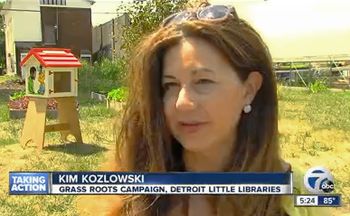 The game was afoot. Kim launched Detroit Little Libraries project in September, 2014, Cindy designed the website, and over the next two years mini-libraries sprung up all over Detroit. In mid-2016, the national Little Free Libraries group, whom Kim collaborated with, honored her by declaring Detroit the FASTEST GROWING LITTLE FREE LIBRARY CITY IN THE COUNTRY. (Btw, Kim accomplished all this while working full-time as a reporter for the Detroit News.)
The game was afoot. Kim launched Detroit Little Libraries project in September, 2014, Cindy designed the website, and over the next two years mini-libraries sprung up all over Detroit. In mid-2016, the national Little Free Libraries group, whom Kim collaborated with, honored her by declaring Detroit the FASTEST GROWING LITTLE FREE LIBRARY CITY IN THE COUNTRY. (Btw, Kim accomplished all this while working full-time as a reporter for the Detroit News.)
Then things got serious. Alycia Meriweather, Detroit's acting superintendent of schools, could hardly miss the tiny libraries popping up on lawns and sidewalks all over the city. They gave Alycia had an idea, so she reached out to Kim Kozlowski.
Like Kim, Alycia believed that literacy is one of the fundamentals needed to turn any city around. Yet the book shortage in Detroit's school system is abysmal. The idea: a project to install a Little Library in each of DETROIT'S 97 SCHOOLS—in 97 DAYS!
How are they doing? Well, the project was just launched, and it's already receiving tremendous community support, to say nothing of press attention, local and regional.
This is where YOU come in. Detroit's project is a terrific opportunity for any book club looking for a way TO GIVE BACK. It's the ideal project for anyone who believes in the power of reading to change lives. Cindy Dyson, the web designer, contacted us at LitLovers to tell us the story and to say that HER book club—all the way out in MONTANA—has pitched in for a Detroit Little Library. Even her mother's book club in ALASKA has joined in...and a visitor at her mother's club that day—from NEVADA—took the concept back home to her book club.
Cindy Dyson, the web designer, contacted us at LitLovers to tell us the story and to say that HER book club—all the way out in MONTANA—has pitched in for a Detroit Little Library. Even her mother's book club in ALASKA has joined in...and a visitor at her mother's club that day—from NEVADA—took the concept back home to her book club.
So click on 97 Days / 97 Schools image (above left)...and learn how YOUR BOOK CLUB can help. You can make a simple donation, or you can purchase a ready-made library model to be installed and filled with books on your behalf. A small act ON YOUR PART can make a big difference—in a city that's working hard to make a difference.
Site by BOOM
![]()
LitLovers © 2024

